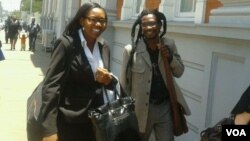WASHINGTON DC —
The Constitutional Court on Wednesday reserved judgement in a case in which it was determining the constitutionality of the Criminal Law Codification and Reform Act which criminalizes the undermining of the authority of the president and communicating falsehoods.
Last year, the ConCourt struck off Section 31 which criminalises publishing or communicating falsehoods and Section 33 criminalizing undermining the authority of the president, saying they were unconstitutional.
The court though had invited Justice Minister Emmerson Mnangagwa to show cause why the sections should not be struck down. Mnangagwa chose to defend the laws and filed an affidavit arguing that the statutes were necessary.
In court Wednesday, the state represented by Chris Mutangadura of the National Prosecuting Authority conceded that the alleged facts outlined in the case in which visual artist Owen Maseko and former Makoni South legislator Pishai Muchauraya are challenging charges of undermining authority of or insulting President Robert Mugabe cannot sustain the charge preferred against them.
Maseko, who was represented by lawyers from the Zimbabwe Lawyers for Human Rights (ZLHR), petitioned the Constitutional Court seeking an order to declare as unconstitutional laws infringing on artists’ rights to free expression and freedom of conscience, particularly freedom of thought as guaranteed in the constitution.
Chief Justice Godfrey Chidyausiku reserved ruling on the matters and advised that the ConCourt will hand down a written order.
Lawyer Jeremiah Bamu said the concession by the prosecutors is significant in their fight for people’s rights.
Last year, the ConCourt struck off Section 31 which criminalises publishing or communicating falsehoods and Section 33 criminalizing undermining the authority of the president, saying they were unconstitutional.
The court though had invited Justice Minister Emmerson Mnangagwa to show cause why the sections should not be struck down. Mnangagwa chose to defend the laws and filed an affidavit arguing that the statutes were necessary.
In court Wednesday, the state represented by Chris Mutangadura of the National Prosecuting Authority conceded that the alleged facts outlined in the case in which visual artist Owen Maseko and former Makoni South legislator Pishai Muchauraya are challenging charges of undermining authority of or insulting President Robert Mugabe cannot sustain the charge preferred against them.
Maseko, who was represented by lawyers from the Zimbabwe Lawyers for Human Rights (ZLHR), petitioned the Constitutional Court seeking an order to declare as unconstitutional laws infringing on artists’ rights to free expression and freedom of conscience, particularly freedom of thought as guaranteed in the constitution.
Chief Justice Godfrey Chidyausiku reserved ruling on the matters and advised that the ConCourt will hand down a written order.
Lawyer Jeremiah Bamu said the concession by the prosecutors is significant in their fight for people’s rights.




